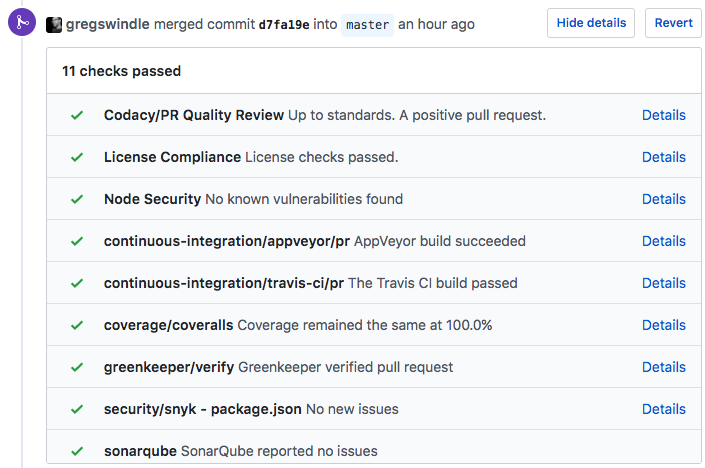-
Notifications
You must be signed in to change notification settings - Fork 9
Repo status badges

We treat every new commonality project repository as a reference repository in order to improve our code; engage the open source community; and delivery better products.
commonality/readme-inspectoris no different.
Every repository's README.md provides real-time, core product status badges that declare
- The product's FOSS license
- Third-party FOSS license obligation status (with FOSSA
)
- Security vulnerability status (with the Node Security Program
and Snyk
)
- Production and development dependency drift status (with David DM
)
- Build and test status on MacOS, Ubuntu, and Windows (with Travis CI
and Appveyor
)
- Test coverage percentage (with Codacy
)
- Code quality status (with Codacy
)
- Maintenance status
-
NPMS
score
- Downloads per month
Inspect GitHub (Enterprise) repositories for the presence and quality of READMEs.
We link to interactive RunKit Notebooks as soon as our Node.js-based products are available on NPM, so you can try before you rely.
We openly guage community activity and engagement on our
/docs/project/README.mdpage.
| Measure | Status/info |
|---|---|
| Community engagement |
        
|
| Issues |
    
|
| Pull requests and merges |
 
|
| Product releases, maintenance, and size |
    |
Our
PULL_REQUEST_TEMPLATE.mdprovides SonarCloud badges to help engineers quickly assess any major code smells or technical debt.
| Measure | Scores |
|---|---|
| Quality gate | |
| Complexity |
|
| Duplications | |
| Issues | |
| Maintainability |
|
| Reliability | |
| Security |
|
| Test coverage |
|
We plainly reference our standards and conventions, as well as the tools we use to enforce those standards.
| Code Style | Linters | Test frameworks | Git commit messages |
|---|---|---|---|
 |
 |
 |
 |
| Standard JS user guide |
ESlint user guide |
Jest user guide |
Conventional Commits |
Finally, we require multiple passing status checks with every push to a pull request.

This work is licensed under a Creative Commons Attribution-ShareAlike 4.0 International License.
CLI snippets for
git.
This checklist—adapted from
bahmutov/npm-module-checklist—provides useful tips to ensure your module is ready for production deployment and publication.
Openly declare the health of your product, project, community, and source code with these essential badges. (GitHub SaaS only.)
Icons, images, gists, code snippets, etc.
- Architecture Decision Record status labels
- Octicon cheatsheet
- Project status badges
- TechRadar labels
Stellar languages, frameworks, platform, techniques, and tools.








